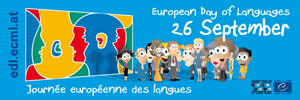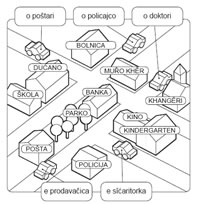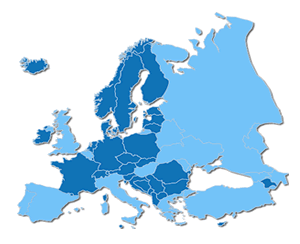1. European
Day of Languages 2014
 The
Council of Europe together with the National
Relays for the European Day of Languages (EDL) have started
preparations for the 2014 edition of the Day. Last year proved an
immense success with more visitors to the EDL's website than ever
before and over 620 events entered into the activities calendar.
Get an impression of the range and scope of the events through the
2013 photo
gallery. The website is now available in 26 languages. The
Council of Europe together with the National
Relays for the European Day of Languages (EDL) have started
preparations for the 2014 edition of the Day. Last year proved an
immense success with more visitors to the EDL's website than ever
before and over 620 events entered into the activities calendar.
Get an impression of the range and scope of the events through the
2013 photo
gallery. The website is now available in 26 languages.
- Photo contest 2014 on language
learning
In preparation for the Day we are launching a contest for the
best photographic representation of language learning. The contest
provides an opportunity to share your perspective on language
learning through the language of photography. This could for example
be a photo of your language class ‘in action’ or use a more abstract
or artistic approach — all entrants are welcome. Above all,
entries should reflect the enjoyment of language learning! More
information about this initiative will be published on the EDL
website and in the next issue of the Gazette.
- Other new features in 2014
We will be adding to the large array of materials already on the
website and encouraging users to feed in their contributions and
suggestions. In addition to the photo competition, among others,
we plan to develop: a new area of the site which highlights unique
features of individual languages, and a game on sign languages.
We will also be continuing the 'Teachshare' section on the site
where we encourage teachers to share materials they have developed
for celebrating the Day with colleagues all over Europe.
- Promotional materials
In addition to 'Talk to me' stickers and lanyards and 'Hello'
posters, this year we will also be offering a limited number of
EDL key rings in a variety of different colours. If you are planning
to organise an event around the European Day of Languages, you
can promote it on a European level by recording it in the
events' calendar on the EDL website and order promotional
items from the National
Relay in your country.
We will keep you informed on the latest developments via our next
newsletter issues.
2. Quality education
and language competencies for 21st century society conference
 The “Quality
education and language competencies for 21st century society: traditions,
challenges, visions” organised under the Austrian Chairmanship of
the Committee of Ministers of Council of Europe (Graz, Austria,
20-21 March 2014) proved a major success. Language acquisition as
a key competence for the future of Europe, multilingualism, quality
and innovation in language education were the issues under the spotlight
at the high-level conference. The event was attended by 150 experts
and decision makers — a further 2,200 viewers from all over
Europe followed the event via live stream. The “Quality
education and language competencies for 21st century society: traditions,
challenges, visions” organised under the Austrian Chairmanship of
the Committee of Ministers of Council of Europe (Graz, Austria,
20-21 March 2014) proved a major success. Language acquisition as
a key competence for the future of Europe, multilingualism, quality
and innovation in language education were the issues under the spotlight
at the high-level conference. The event was attended by 150 experts
and decision makers — a further 2,200 viewers from all over
Europe followed the event via live stream.
3. QualiRom: new databank
of teaching and learning materials for Romani
 The “Quality
education in Romani for Europe” (QualiRom) initiative has published
an extensive databank of teaching and learning materials for teachers
of Romani (http://qualirom.uni-graz.at).
The materials developed in six Romani varieties range from proficiency
levels A1 to B2 for learners at primary, secondary and tertiary
levels and constitute the largest resource of its kind for the teaching
and learning of the Romani language based on European standards.
The databank comprises 39 sets of materials (some 16 000 pages!)
in Arlije, East Slovak, Finnish, Gurbet, Lovara and Kalderaš. The “Quality
education in Romani for Europe” (QualiRom) initiative has published
an extensive databank of teaching and learning materials for teachers
of Romani (http://qualirom.uni-graz.at).
The materials developed in six Romani varieties range from proficiency
levels A1 to B2 for learners at primary, secondary and tertiary
levels and constitute the largest resource of its kind for the teaching
and learning of the Romani language based on European standards.
The databank comprises 39 sets of materials (some 16 000 pages!)
in Arlije, East Slovak, Finnish, Gurbet, Lovara and Kalderaš.
The materials use a task-based approach
and can be adapted to the specific needs of particular educational
contexts. To ensure their effectiveness in the classroom the materials
have been developed and piloted in close cooperation with local
Romani teachers as well as national educational authorities in five
countries: Austria, the Czech Republic, Finland, Slovakia and Serbia.
During this process children who used the materials developed learning
skills – such as the ability to make decisions when working in pairs
or groups and to evaluate their own learning - that may not have
been encouraged within their mainstream education.
The QualiRom initiative focusing on raising
literacy levels in Romani was carried out under the European Commission’s
Key Actions 2 programme. In training teachers of Romani the 3-year
project made extensive use of the Curriculum Framework for Romani
(CFR) and two European Language Portfolio models developed by the
Council of Europe’s Language Policy Unit in co-operation with the
European Roma and Travellers’ Forum.
The ECML together with the other project partners and the project
coordinators, the Plurilingualism Research Unit, Karl-Franzens University
(Graz, Austria), will examine possible follow-up measures to further
promote the use of this impressive resource both in teacher development
programmes and directly with learners in countries with Roma populations.
For further information please contact
the ECML [email protected]
4. Language education
resources and ECML expertise in ECML member states and beyond: new
online platform
 The platform
provides information about the national representatives to the ECML
(Governing Board members, National Nominating Authorities, National
Contact Points, national relays for the European Day of Languages,
national contacts for the European Language Portfolio), experts
involved in ECML activities, as well as resources and information
sources relating to language education. Currently it covers 43 states. The platform
provides information about the national representatives to the ECML
(Governing Board members, National Nominating Authorities, National
Contact Points, national relays for the European Day of Languages,
national contacts for the European Language Portfolio), experts
involved in ECML activities, as well as resources and information
sources relating to language education. Currently it covers 43 states.
A workshop for ECML National Nominating
Authorities and National Contact Points took place in Graz on 12-13
June 2014 to discuss further developments related to the process
of nominating experts for ECML events, the next programme of the
ECML 2016-2019, dissemination initiatives and impact of the work
of the ECML.
5. Language education:
news from our member states and our partners
 ECML
National Contact Points ECML
National Contact Points
ARMENIA: focus on the Framework
of Reference for Pluralistic Approaches to languages and cultures
(FREPA)
- The FREPA
country page for Armenia (in Armenian) offering useful
information on pluralistic approaches in the country is now online.
- Piloting pluralistic approaches:
The YSULS Centre for the Implementation of Council of Europe Language
Education Programmes piloted teaching materials based on pluralistic
approaches in Yerevan’s N20 secondary school from March to April
2014. The aim of the piloting was to try to estimate the extent
to which FREPA approaches could be implemented in the Armenian
secondary education context in advance of an ECML training and
consultancy workshop scheduled on this theme in October. The materials
chosen had to deal with the FREPA awakening to languages, integrated
didactics and intercultural approaches + CLIL as other approach.
The languages involved included: Armenian (as mother tongue and
language of schooling), Russian, English, Arabic and French. The
results of the piloting are in the process of discussion and consideration.
- The next international workshop
in Armenia on “Plurilingual and intercultural competences:
descriptors and teaching materials” (YSULS, Yerevan, 1-3 October
2014) will seek to enhance plurilingual and intercultural education
in Armenia both at grassroots level (teacher trainers and classroom
teachers) and at policy level (curriculum design and reforms of
educational policies in Armenia). The target groups and stakeholders
are policy makers, teacher trainers, curriculum developers, school
and university teachers of Armenian, Russian, English, French,
German, student teachers from the YSULS Chair of Pedagogy and
Methodology.
AUSTRIA: latest e-newsletter
ÖSZ
Sprachbox, e-newsletter, May 2014 (in German).
DENMARK: dedicated ECML website
Discover the National Contact Point’s
website http://ecml.dk/ (available
in Danish) dedicated to the work of the ECML including information
about projects, workshops and other events, participation and
networking opportunities, as well as ways to stay informed about
ECML related developments.
FRANCE: latest e-newsletter
Courriel
européen des langues, CIEP e-newsletter (in French), June
2014.
GERMANY
- Given the growing importance of multilingualism
in an increasingly interdependent world, the Standing Conference
of Ministers of Education and Cultural Affairs for the Länder
(KMK) has formulated a set of guidelines and areas for action
for a future-oriented foreign language teaching in its recommendations
for the strengthening of foreign language competence — “Empfehlungen
zur Stärkung der Fremdsprachenkompetenz” (KMK decision
of 08.12.2011).
- The first foreign language classes already
take place in primary school. This relates principally to grades
3 and 4, and in some Länder, to grades 1 and 2. The changing needs
of society and beneficial conditions facilitating language acquisition
for this age group are two of the reasons for the inclusion of
foreign language learning in primary education. The report of
the Standing Conference provides an overview of the specific situation
in the individual Länder: “Fremdsprachen
in der Grundschule - Sachstand und Konzeptionen 2013”
(KMK decision of 10.17.2013).
- The report “Konzepte
für den bilingualen Unterricht - Erfahrungsbericht und Vorschläge
zur Weiterentwicklung” “(Concepts for bilingual
instruction — Review and suggestions for further development)”;
provides information on the current state of bilingual teaching
(content and language integrated learning, CLIL) (KMK decision
of 10.17.2013).
- In the past the Standing Conference
has repeatedly dealt with the further development of foreign language
education. A particular focus has been the development and introduction
of nationwide educational standards for the continuation of the
first foreign language (English / French) for the general higher
education (KMK decision from 18.10.2012). This made it possible
to describe realistic yet ambitious educational goals in terms
of competences and task formats.
Bildungsstandards für die fortgeführte Fremdsprache (Englisch/Französisch)
für die Allgemeine Hochschulreife
- The report of the Standing Conference
“Zur
Situation des Französischunterrichts an den allgemein bildenden
Schulen in der Bundesrepublik Deutschland” (drafted
on 20 March 2000 and amended on 5 June 2013) shows how the “partner”
language could be strengthened through bilateral cooperation,
using the example of teaching French in Germany.
The Länder give special attention to activities promoting neighbouring
languages. For example, the “Franco-German
Day” which was celebrated for the first time on 22 January
2004 in Germany and France has become a well-established fixture.
The "German-French Day" activities dedicated to Franco-German
relations now take place during almost a whole month.
SWEDEN
21
flyer publications of the ECML programme of activities 2008-2011 translated in Swedish by the National Agency of Education,
Stockholm (National
Contact Point for the ECML in Sweden).
European Union
Conclusions
on multilingualism and the development of language competences
(Brussels, 20 May 2014)
Conclusions
du Conseil sur le plurilinguisme et le développement des compétences
linguistiques (Bruxelles, 20 mai 2014)
Modernisation
of Higher Education in Europe: Access, Retention and Employability,
Eurydice report, May 2014 (only in English)
Professional Network Forum on Language
Education of the ECML
The European
Association for Language Testing and Assessment (EALTA) has
accepted a proposal handed in by the ECML
ProSign expert team to install a Special
Interest Group for signed
language assessment:
View
the webpage dedicated to the Professional Network Forum of the ECML
The European Wergeland Centre
European resource centre on education for
intercultural understanding, human rights and democratic citizenship.
News page
6. Resources
 ECML ECML
- ECML information brochure
Download
here
(available in English, French translation pending)
- Revamped website of the ECML
project “Diversity in Majority Language learning”
(MALEDIVE, 2012-2015) http://maledive.ecml.at/:
the website includes study materials, pedagogical resources, publications
and presentations
- A Framework of Reference for
Pluralistic Approaches to languages and cultures (FREPA) (2012)
- Translated into Arabic (2014); coordination
of the translation: Fatima ELKHALLOUFI, University Mohammed
V Souissi, Faculty of Education, Rabat Morocco
FREPA
in other languages
- Troncy, Christel (dir.); de Pietro,
Jean-François; Goletto, Livia; Kervran, Martine (collab.). Didactique
du plurilinguisme. Approches plurielles des langues
et des cultures. Autour de Michel Candelier. Rennes : Les
Presses universitaires de Rennes, 2014, ISBN : 978-2-7535-2913-7,
514 pages.
Introduction,
table of contents, information about the authors, abstract:
downloadable on the website of Presses universitaires de Rennes
(book available in French)
- International Conference “Crossing
continents: The European Portfolio for Student Teachers of Languages
(EPOSTL) around the world” (ECML, Graz, Austria,
18-19 February 2014). This conference enabled to exchange information
about using the EPOSTL in pre-service teaching, teaching practice,
in-service teacher development; EPOSTL-related publications; research
on EPOSTL (articles, dissertations etc.) and innovative uses and
the scope of the EPOSTL.
Language Policy Unit, Council of
Europe (Strasbourg, France)
Migrants' integration and language
tests
During its plenary session in January 2014, the Parliamentary Assembly
of the Council of Europe (PACE) adopted a recommendation to the
Committee of Ministers on “Integration
tests: helping or hindering integration?” The PACE ‘Committee
on migration refugees and displaced persons’ prepared a report presented
by Tineke Strik, drawing on the results and resources made available
on the website dedicated to the linguistic integration of adult
migrants (LIAM) www.coe.int/lang-migrants,
developed by the Language Policy Unit. In particular, the Recommendation
makes explicit references to the LIAM Project, such as “The Assembly
also notes the important activities carried out by the Language
Policy Unit of the Council of Europe, and in particular its work
on Linguistic Integration of Adult Migrants (LIAM). 7. In this context,
the Assembly invites the Committee of Ministers to: […] 7.1. undertake,
through its Language Policy Unit (Education Department, DG II),
further work in respect to the CEFR, […] , 7.3. promote further
the work of the Council of Europe on Linguistic Integration of Adult
Migrants”
Council of Europe Intergovernmental
Conference
“Quality in the linguistic integration of adult migrants (LIAM):
From values to policy and practice” (Strasbourg, France, 3-4
June 2014): conference
website
Latest publications
Framework Convention for the Protection
of National Minorities (FCNM)
Latest
developments in Bosnia and Herzegovina, Cyprus, Denmark, Estonia,
Georgia, Liechtenstein, Netherlands, Poland, Switzerland, Ukraine,
United Kingdom
Pestalozzi programme
The Council of Europe's training and capacity
building programme for all education professionals in Europe.
7. Quick links
 Council
of Europe Council
of Europe
Council
of Europe news page
European Day of Languages
European Centre for Modern Languages
(ECML)
Language
Policy Unit
European
Charter for Regional or Minority Languages
Pestalozzi
Programme
Keep yourself informed
News
on the ECML portal
ECML on Facebook
ECML on Twitter
ECML
activities 2014
All
issues of the European Language Gazette |

 The
Council of Europe together with the
The
Council of Europe together with the  The “Quality
education and language competencies for 21st century society: traditions,
challenges, visions” organised under the Austrian Chairmanship of
the Committee of Ministers of Council of Europe (Graz, Austria,
20-21 March 2014) proved a major success. Language acquisition as
a key competence for the future of Europe, multilingualism, quality
and innovation in language education were the issues under the spotlight
at the high-level conference. The event was attended by 150 experts
and decision makers — a further 2,200 viewers from all over
Europe followed the event via live stream.
The “Quality
education and language competencies for 21st century society: traditions,
challenges, visions” organised under the Austrian Chairmanship of
the Committee of Ministers of Council of Europe (Graz, Austria,
20-21 March 2014) proved a major success. Language acquisition as
a key competence for the future of Europe, multilingualism, quality
and innovation in language education were the issues under the spotlight
at the high-level conference. The event was attended by 150 experts
and decision makers — a further 2,200 viewers from all over
Europe followed the event via live stream. The “Quality
education in Romani for Europe” (QualiRom) initiative has published
an extensive databank of teaching and learning materials for teachers
of Romani (
The “Quality
education in Romani for Europe” (QualiRom) initiative has published
an extensive databank of teaching and learning materials for teachers
of Romani ( The
The  ECML
National Contact Points
ECML
National Contact Points ECML
ECML Council
of Europe
Council
of Europe